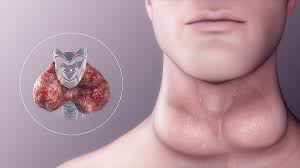Thyroid Disorder

Thyroid gland is a soft, butterfly-shaped gland located in front of the neck, just below the Adam’s apple. Thyroid gland needs iodine to produce hormones, T4 and T3, which are essential to regulate metabolic processes in the whole body. The production of thyroid hormones (T4 and T3) is controlled (called feedback mechanism) by brain via pituitary gland, which releases thyroid stimulating hormone (TSH).
Disorders of the thyroid gland adversely affect the body’s structure or function. Thyroid problems are nearly 5-6 times more common in women.
What are the different kinds of thyroid problems?
The important disorders of the thyroid gland are discussed below:
- Hypothyroidism symptoms and causes:
Hypothyroidism is the most common thyroid disorder where the thyroid gland produces inadequate quantity of thyroid hormones. Some common hypothyroidism symptoms in women and men are:
- Swelling in body due to fluid retention
- Intolerance to cold temperatures
- Constipation
- Depression
- Dryness of skin
- Inability to concentrate
- Menstrual irregularities
- Muscle and joint pains
- Tiredness or fatigue
Common hypothyroidism causes are:
- Inflammation of the thyroid gland (e.g. in Hashimoto’s thyroiditis, postpartum thyroiditis and acute thyroiditis)
- Problems in the pituitary or hypothalamus glands
- Resistance to thyroid hormone
- Hyperthyroidism symptoms and causes:
Hyperthyroidism is relatively less common than hypothyroidism, a condition with abnormally high production of thyroid hormone. Some common hyperthyroidism symptoms in women and men are:
- Anxiety and nervousness
- Heat intolerance
- Inability to concentrate
- Loose motions or increased bowel activity
- Palpitations or increased heart rate
- Tiredness
- Tremors
- Weight loss
Common hyperthyroidism causes are:
- Excessive iodine intake
- Graves’ disease
- Nodules of thyroid gland
- Toxic goiter with nodules
- Goiter:
An enlargement of the thyroid gland irrespective of the underlying cause is called a goiter. Not a disease in itself, goiter is an indication of an underlying problem such as hypothyroidism, hyperthyroidism, or an abnormality of the thyroid gland.
- Thyroid nodules:
Nodules or abnormal lumps within the thyroid glands can be formed due to non-cancerous tumors or cysts, or sometimes due to cancers of the thyroid gland. These nodules vary from small to large and single to multiple. Extremely large nodules of the thyroid gland can even compress the adjacent structures like windpipe (trachea).
- Thyroid cancer:
Thyroid cancers are more common among elderly women, than men. Thyroid cancers are generally treatable. Most of the patients survive if detected early.